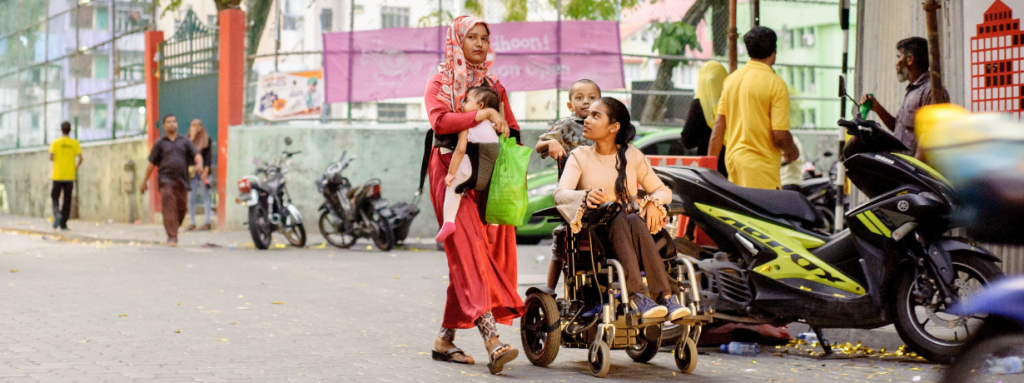Co-author: Naomi Menezes
5 min read
A majority of India’s 26.8 million persons with disabilities (PwDs) have faced hardships during the COVID-19 crisis. A WHO health advisory warns how PwDs may be at greater risk of contracting the infection due to the following reasons:
- Basic sanitation measures such as regular hand-washing may be inaccessible to them
- Inability to maintain social distancing due to the need for special support
- The need to touch objects or persons to interact with them, or even to interact with their physical surroundings
- Increased risk of severe cases of COVID-19 due to underlying health conditions
In late March 2020, the Central Government released a set of guidelines for the safety and protection of PwDs. Amidst calls for physical distancing and adjustments to the new normal, however, PwDs were left out. To ensure that they have access to essential information, NGOs and social enterprises have been working round the clock to design accessible material and provide alternate solutions.
Mr. Satosh Rungta, President National Federation of the Blind, highlights, “The pandemic has come at a time when the process of inclusion of PwDs was just beginning. Fear created by the need of social distancing has challenged this work and put it in reverse gear’.
Addressing disruptions to routines
“For children with intellectual disabilities (ID), lack of essential nutrition, beyond the food basics supplied by BMC, has been fatal. There have been 22 reported deaths of children in the last 6 months in the communities we work with.” – Sonalee Shamysundar, Founder of Urmi Foundation, which has partnered with 123 special schools and supported over 4238 children with IDs.
There are continued reports of debilitating health and wellbeing of children with IDs in low-income communities – the last priority of households with meagre resources. Urmi has been able to train 144 Aanganwadi sevika and teachers in early detection, nutrition and disability prevention training for pregnant mothers this year alone. While the progress made in the last few years seems to have stagnated or even regressed, stopping interventions is not an option. Team Urmi finds solace in the success of its new auditory learning curriculum and a timetable essential for the mental wellbeing of the children under its care. This has been critical in Urmi’s engagement with families and children with IDs who are navigating this new world in which family members are home, full-time and creating more noise.
“Any break from routine, any change in pattern and behaviour could cause regression in skill development. That’s why we started recreational therapy activities online. Along with music and dance, we incorporated the training that we gave onsite, so now there is a cooking class every single day along with literacy and math classes – a holistic way of keeping them engaged.” – Ashaita Mahajan, Co-Founder of Yash Charitable Trust, an NGO that provides skill training and employment opportunities to adults with developmental and intellectual disabilities through their Cafe Arpan in Juhu, Mumbai.
Aman and his team at TEACH – a non-profit organisation (NPO) that works with hearing and visually-impaired students and caters to their educational and employment needs – are doing their best to ensure that students’ learning is not disturbed. With school and college curriculum moving online, they ensured students had internet access by paying for data top-ups and classes were conducted in sign language. Moreover, TEACH began hosting sign language workshops for family members to improve communication at home.
Adapting to the future of work
While education for PwDs is adapting to the changes borne out of the pandemic, young adults who have physical or intellectual disabilities struggle to find jobs and earn a decent living.
“The largest employment avenues, such as retail and hospitality, have come to a standstill. Before the pandemic, 60% of the placements were in the organized sector. This has drastically fallen to 35%.” shares Meera Shenoy, CEO of Youth4Jobs, who highlights that finding employment opportunities for PwDs has been challenging as the market has completely changed.
Compounding this issue is the isolation experienced in workplaces. Team members view PwDs as a walking health threat as some use ‘touch’ as their primary mode for mobility. “There have been reports of them being relegated to isolated work areas” shares Mr Santosh Rungta, President National Federation of the Blind
Given their limited mobility, PwDs would benefit greatly from local opportunities. The Micro, Small & Medium Enterprises (MSME) sector, however, lacks awareness of the hiring practices for PwDs. Creating a centralised database will help PwDs identify jobs and facilitate local job matchmaking .
Towards an Inclusive Future
The coronavirus has created greater stigmatisation within the lives of PwDs and their families.
“What we have been experiencing – no movie and other restrictions, the mother of a child with autism has always had to live like this,” observes Prachi Deo, Founder of Nayi Disha Resource Center, who draws a parallel between how those infected by COVID-19 were initially treated as outcasts and the exclusion faced by PWDs daily.
Nayi Disha has been able to reach out to 2800 families with individuals with IDDs through their helpline in 6 cities, online events and support groups. Disability itself has never been a barrier, the lack of support is. The first step towards integrating PWDs is to move from a charity-based to a rights-based approach that sees differently-abled persons as equal citizens. The 2016 Rights to Persons with Disabilities Act makes a step in this direction. It will, however, take each of us to consciously create a supportive and accepting society for PwDs.
Apart from adopting a rights-based approach, here are a few ways that we can build a more inclusive society:
- Promote inclusive hiring in your organisation that is backed by required infrastructure and awareness for all employees who will engage with PwDs on a day-to-day basis
- Actively donate money and necessary resources to NGOs working in this space
- Mentor an organization and become a champion a cause that resonates with you


















